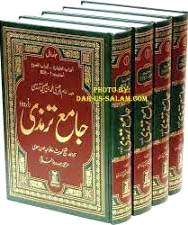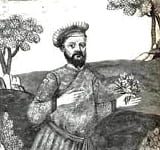(The Hadith Books, The Hadith As Source of Arabic Literature, The Hadith Books: Bukhari Sharif, Muslim Sharif, Abu Dawud Sharif, Tirmidhi Sharif, Nisai, Ibn Majah)
The Hadith Books | The Hadith As Source of Arabic Literature
The Hadith As Source of Arabic Literature
Next only to the Qur’an, the books of Hadith are one of the strongest and most significant sources of Arabic language and literature of the early Islamic period. ‘Hadith’ refers to everything said, done and approved by the Prophet Muhammad (peace be upon him). In other words, the account of the life of the Prophet Muhammad (peace be upon him), his letters to his representatives in various places and prominent persons at home and abroad, the account of the various persons who visited him, friends, companions, relatives and the account of various battles fought by Muhammad etc. are also included in the books of Hadith. Like the Qur’an, the basic book of Islam, the books of Hadith are considered equally important and dignified. Therefore, Muslims study the Qur’an as well as the Hadith books with much importance.
The life of the Prophet Muhammad (peace be upon him) was guided by the instructions of the Qur’an. Therefore, the real reflection of the laws addressed to mankind by Allah through the Qur’an occurred in the life of the Prophet Muhammad (peace be upon him). Therefore, the Prophet is also called the practical Qur’an. The matters related to religion that were not clearly explained in the Qur’an were explained by the Prophet Muhammad to his followers in his own language. All those explanations are included in the Hadith books. Therefore, studying the books of Hadith makes the subjects of the Qur’an very easy and comprehensible.
During the lifetime of the Prophet Muhammad (peace be upon him), some people began to write down his words, way of life, solutions to various real-life problems, advices given to his followers etc., but the Prophet prevented them from writing them down. This was because the Prophet Muhammad (peace be upon him) was afraid that people might later combine these with the verses of the Qur’an and thus destroy the originality of the Qur’an. But his beloved companions and those who came into his presence listened to his sayings, discussions, advices etc. with much attention and bore them in memory.
After the death of the Prophet Muhammad (peace be upon him), his sayings began to be forgotten as time went on. The companions of the prophets also died. As a result, the hadiths of the Prophet (peace and blessings be upon him) were almost on the verge of loss. In this context, about two hundred years after the death of the Prophet Muhammad (peace be upon him), some Islamic scholars traveled to different countries of the Islamic Empire, met people who knew Hadiths and collected the Hadiths from them. Among such individuals there were Imam Muhammad ibn Ismail al-Bukhari, Abul Hasan Muslim al-Nishapuri, Abu Dawud Sulayman, Abu ‘Isa Muhammad Tirmidhi, Abu ‘Abdur Rahman ibn Sinan, Abu Abdullah Muhammad ibn Yazid al-Majah, and a few others. The following is a brief discussion of the books of Hadith collected and compiled by these scholars.
The Hadith Books | The Hadith As Source of Arabic Literature
Bukhari Sharif
The most famous and widely discussed book of Hadith is Bukhari Sharif. This book was compiled by a scholar named Muhammad ibn Ismail al-Bukhari (810-870 AD). He was born into an educated family in the city of Bukhara, then in Khorasan (now Uzbekistan). His father’s name was Ismail bin Ibrahim. He was an Islamic scholar. At an early age, he taught his son Muhammad ibn Ismail the Qur’an and Hadith. Ibn Ismail began his studies of Hadith at the age of eleven and became a scholar of Hadith at the age of sixteen. He traveled to Damascus, Egypt, Basra and other Muslim countries to learn more about Hadiths and met people who knew Hadiths in those countries and collected 60,000 Hadith from them. He later examined their authenticity and compiled only 7,225 hadiths from them into a book. This book is called ‘Bukhari Sharif’ after his name. The author’s Bukhari Sharif is the first book of Hadith. The hadiths contained in the book are considered authentic. Therefore, the Bukhari Sharif is given importance after the Qur’an.
The Hadith Books | The Hadith As Source of Arabic Literature
Muslim Sharif
Muslim Sharif is the second most popular book of Hadith. This book was compiled by a Muslim scholar named Abul Hasan Muslim al-Nishapuri (815-875 AD). He is known as Imam Nisapuri. He was born in the city of Nisapur in Khorasan (modern Iran). He began studying Hadith from his father at the age of eighteen. He then went to Syria, Iraq, and Egypt for further studies and worked hard to meet people who knew hadiths in those places and collected about 30,000 hadiths. He later selected them on the basis of purity and compiled 9,200 hadiths into a book. The book of Hadith he compiled is called ‘Muslim Sharif‘ after his name. He was a contemporary of Imam Bukhari. It is second only to Bukhari Sharif in terms of purity.
The Hadith Books | The Hadith As Source of Arabic Literature
Abu Dawud Sharif
Abu Dawud Sharif is the third most famous book of Hadith. It was compiled by a Muslim scholar named Abu Dawud Sulaiman al-Chizistani (818-889). He was born in the city of Basra in Chizistan. He was very curious from an early age and to acquire Islamic knowledge he visited educational institutions in various places and met many people who knew Hadith and collected 50,000 Hadiths. He later considered their reliability and prepared a collection of 4,800 hadiths. After his name, this collection of hadith is called ‘Abu Dawud Sharif’.
The Hadith Books | The Hadith As Source of Arabic Literature
Tirmidhi Sharif
Tirmidhi Sharif is the fourth most popular book of Hadith. This was compiled by a scholar named Abu ‘Isa Muhammad al-Tirmidhi (824-892). He was born in Tirmiz, Uzbekistan. He became proficient in the Qur’an, Arabic grammar and Hadith at an early age and traveled to various places to learn more about Hadith. During his travels, he met people who knew hadith and collected about 50,000 hadiths from them and later compiled a book of 1,600 hadiths. The book of Hadith he compiled is called ‘Tirmidhi Sharif’ after his name.
The Hadith Books | The Hadith As Source of Arabic Literature
Nisai
One of the reliable sources of the early Islamic language and literature is the hadith book entitled ‘Nisai’. It was compiled by Abu Abdur Rahman Ahmad ibn Sinan (829-915 AD). He was born in the city of Nasa in present-day Turkmenistan. He received his primary education in his native place and left home at the age of fifteen to seek knowledge and traveled to Iraq, Kufa, Hijaz, Syria and Egypt, and acquired considerable knowledge of the Qur’an and Hadith. He was also a good orator and gave lectures on Islamic philosophy at various places. During his travels, he collected many hadiths and compiled 4,482 hadiths selecting from them on the basis of reliability. He then traveled to various places and arrived in Damascus where he died in 915 AD.
The Hadith Books | The Hadith As Source of Arabic Literature
Ibn Majah
Ibn Majah is the sixth book of Hadith in Arabic. This was compiled by Abu Abdullah Muhammad ibn Zayd al-Majah (824-887), an Islamic scholar. He was born in Qazwin, Iran. He became a scholar of the Qur’an at an early age and then he traveled to Iraq, Mecca, and Egypt to collect Hadith. He collected many hadiths but produced a collection of only 4,000 hadiths in consideration of purity. The book of Hadith he compiled is called ‘Ibn Majah’ after his name.
The six books of hadiths discussed above are collectively called ‘Siha Sittah’ (pure books of hadith). Muslims rank these six books of Hadith after the Qur’an.
In addition to these six books of Hadith, there are several other minor books of Hadith such as al-Muttah, Sunan al-Darami, Masabi al-Sunnah, Wali al-Din Tibrizi, etc. However, the hadiths contained in these books are considered weak hadiths. 0 0 0.
The Hadith Books | The Hadith As Source of Arabic Literature
Read More: A Brief History of Arabic Literature: Pre-Islamic Period (500 AD-622 AD)
Note: The article ‘The Hadith Books | The Hadith As Source of Arabic Literature’ originally belongs to the book entitled ‘A Brief History of the Arabic Literature: Early Islamic Period (622 AD -661 AD)’ by Menonim Menonimus. The Hadith Books | The Hadith As Source of Arabic Literature
The Hadith Books | The Hadith As Source of Arabic Literature
Related Searches:
- Arabic Literature-The Qur’an
- The Noble Qur’an
- The Hadith Collection
- Hadith Books
- Sunnah.Com
Books of Literary Criticism by M. Menonimus:
- World Short Story Criticism
- World Poetry Criticism
- World Drama Criticism
- World Novel Criticism
- World Essay Criticism
- Indian English Poetry Criticism
- Indian English Poets and Poetry Chief Features
- Emily Dickinson’s Poetry-A Thematic Study
- Walt Whitman’s Poetry-A Thematic Study
- Critical Essays on English Poetry
- Tawfiq al-Hakim’s Novel: Return of the Spirit-An Analytical Study
- Tawfiq al-Hakim’s Novel: ‘Yawmiyyat Naib Fil Arayaf’-An Analytical Study
- Analytical Studies of Some Arabic Short Stories
- A Brief History of Arabic Literature: Pre-Islamic Period (500 AD-622 AD)
- A Brief History of Arabic Literature: Early Islamic Period (622 AD-661 AD)
- The Hadith Books | The Hadith As Source of Arabic Literature …
A Brief History of Arabic Literature: Early Islamic Period











